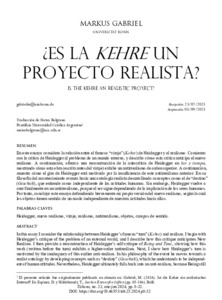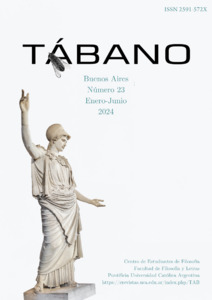Please use this identifier to cite or link to this item:
https://repositorio.uca.edu.ar/handle/123456789/17781| Título: | ¿Es la Kehre un proyecto realista? Is the kehre an realistic proyect? |
Autor: | Markus, Gabriel | Palabras clave: | Heidegger, Martin, 1889-1976; REALISMO; ANTIRREALISMO; FILOSOFIA CONTEMPORANEA | Fecha de publicación: | 2024 | Editorial: | Pontificia Universidad Católica Argentina. Facultad de Filosofía y Letras. Centro de Estudiantes de Filosofía | Cita: | Markus, G. ¿Es la Kehre un proyecto realista? [en línea]. Tábano. 2024, 23. doi:10.46553/tab.23.2024.p8-32. Disponible en: https://repositorio.uca.edu.ar/handle/123456789/17781 | Resumen: | Resumen:
En este ensayo considero la relación entre el famoso “viraje” (Kehre) de Heidegger y el realismo. Comienzo
con la crítica de Heidegger al problema de un mundo externo, y describo cómo esta crítica anticipa el nuevo
realismo. A continuación, ofrezco una reconstrucción de la autocrítica de Heidegger en Ser y tiempo,
mostrando cómo esta obra (escrita antes del viraje) exhibe un antirrealismo de orden superior. A continuación,
muestro cómo el giro de Heidegger está motivado por la insuficiencia de este antirrealismo anterior. En su
filosofía del acontecimiento avanza hacia una ontología realista desarrollando conceptos como el de “destino”
(Geschick), que entiende como independiente de las actitudes humanas. Sin embargo, Heidegger vuelve a
caer finalmente en un antirrealismo, porque el ser sigue dependiendo de la implicación de los seres humanos.
Por tanto, concluyo este ensayo defendiendo brevemente mi propia versión del nuevo realismo, según la cual
los objetos tienen sentido de un modo independiente de nuestras actitudes hacia ellos. Abstract: In this essay I consider the relationship between Heidegger’s famous “turn” (Kehre) and realism. I begin with Heidegger’s critique of the problem of an external world, and I describe how this critique anticipates New Realism. I then provide a reconstruction of Heidegger’s self-critique of Being and Time, showing how this work (written before the turn) exhibits a higher-order antirealism. Next, I show how Heidegger’s turn is motivated by the inadequacy of this earlier anti-realism. In his philosophy of the event he moves towards a realist ontology by developing concepts such as “destiny” (Geschick), which he understands to be independent of human attitudes. Nevertheless, Heidegger ultimately falls back into an anti-realism, because Being still remains dependent upon the involvement of human beings. I therefore conclude this essay by briefly arguing for my own version of New Realism, according to which objects are meaningful in a way that is independent of our attitudes towards them. |
URI: | https://repositorio.uca.edu.ar/handle/123456789/17781 | ISSN: | 2591-572X | Disciplina: | FILOSOFIA | DOI: | 10.46553/tab.23.2024.p8-32 | Derechos: | Acceso abierto | Fuente: | Tábano No. 23, 2024 |
| Appears in Collections: | TAB - 2024 nro. 23 |
Files in This Item:
| File | Description | Size | Format | |
|---|---|---|---|---|
| kehre-proyecto-realista.pdf | 553,15 kB | Adobe PDF |  View/Open | |
| tapa-tabano.png | 1,54 MB | image/png |  View/Open |
Page view(s)
23
checked on Apr 27, 2024
Download(s)
13
checked on Apr 27, 2024
Google ScholarTM
Check
Altmetric
Altmetric
This item is licensed under a Creative Commons License

